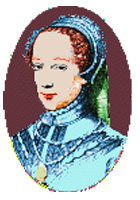Louise Labe Biography
Louise Labe was born in the early 1520s to a prosperous rope-maker, a member of the Lyon bourgeoisie. Her mother died when she was a child; her father had her educated in languages and music, and a brother may have taught her to ride and fence. She was married in her mid-teens to another rope-maker, some 30 years older than she. It was apparently after her marriage that she began to participate in the literary circles of Lyon.
In 1555 Euvres de Louize Labe Lionnoize was published in Lyon: it contained a prose dedicatory epistle to a local noblewoman, a prose Debat de Folie et d'Amour, 24 sonnets (the first in Italian), and three elegies; the work concluded with 24 poems by other writers, praising Labe's ability. The book was popular enough that three other editions came out within a year (the first Revues et corrigees par la dite Dame), and it was widely-read enough to bring both praise from beyond Lyon and criticism for being immodest and "unwomanly."
Sometime after 1556, Labe apparently left Lyon to live in the countryside. Her husband died in the early 1560s and she died, perhaps of the plague, in 1566.
Long-felt desires, hopes as long as vain--
sad sighs--slow tears accustomed to run sad
into as many rivers as two eyes could add,
...
I flee the city, temples, and each place
where you took pleasure in your own lament,
where you used every forceful argument
...
While yet these tears have power to flow
For hours for ever past away;
While yet these swelling sighs allow
My faltering voice to breathe a lay;
...
While I have tears that start into my eyes,
At memories of joys that we have known
And while my voice, still master of its own,
Is not yet choked with sobbing and with sighs.
...
All love is seen to fade and pass away.
When soul blends body by most subtle art,
I am the body, you the better part.
But O my well-loved soul, why did you stray ?
...
